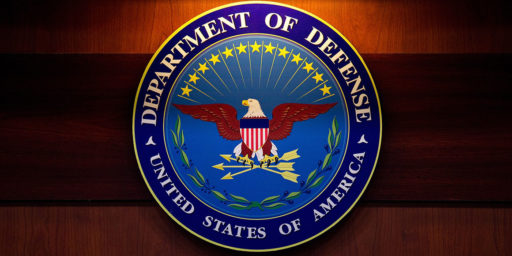Don’t Ask, Don’t Tell Reinstated, But Discharges Will Be More Difficult
The Pentagon has reinstated Don't Ask, Don't Tell under procedures that will make the discharge process more difficult. Which is good because it doesn't look like DADT will be repealed any time soon.
In the wake of the Ninth Circuit Court of Appeals’ putting a stay on a lower court injunction, the military’s Don’t Ask, Don’t Tell policy is back in effect, but new procedures are likely to make discharges under the policy less common than they used to be:
“Don’t ask, don’t tell” is back on the books, but just five senior military officials will be able to discharge service members for violating it, the Pentagon said Thursday. The change in policy makes it tougher to remove gay troops by prolonging the review process and adding additional layers of scrutiny before making a final decision, senior military officials said.
Effective immediately, Air Force Secretary Michael B. Donley, Army Secretary John M. McHugh and Navy Secretary Ray Mabus will have to consult with the Pentagon’s top lawyer, Jeh Johnson, and the undersecretary of defense for personnel, Clifford Stanley, before removing anyone for violating the ban on gays serving openly in the military, according to a memo Stanley wrote Thursday.
“This latest twist highlights the legally uncertain period in which we now find ourselves,” Stanley said in his memo.
A senior military official familiar with the matter said, “This is no way puts in place a moratorium, nor does it change the legal standard by which we’ll judge these cases.”
But the official conceded that the review process will take longer because a greater number of officials will have to review a case before the service secretaries make a final decision.
“We’re not raising the bar or lowering the bar, the bar has always been high, but we’re going to put the separation authority in fewer, more senior hands who will be most up to date on this changing legal landscape,” said the official, who was not authorized to speak on the record.
The policy is in effect until further notice, meaning it could end if the federal courts issue another injunction or if Congress repeals the law. Additional guidance regarding military recruitment policy is forthcoming, the Pentagon said.
Aubrey Sarvis, executive director of the Servicemembers Legal Defense Network, called the decision “a major, constructive development for gay and lesbian service members.” SLDN represents service members in cases involving the “don’t ask, don’t tell” law.
The change means officers and enlisted personnel will both undergo a more serious review by the most senior military officials.
“Essentially the Pentagon appears to be saying to the court and to service members: ‘We will treat enlisted service members the same way we now treat all officers,’ ” Sarvis said.
What seems fairly clear here is that the Pentagon is setting up a process that will make decision making under DADT take as long a time as possible, obviously hoping that either the Courts or Congress will act at some point to bring the whole process to an end.
Whether, or more precisely when, that will happen is an open question, though. The Pentagon’s report on DADT repeal is scheduled to be released sometime in December, but with Congress only being in session for two weeks between the elections and the end of the year, it’s unlikely that there will be sufficient time for the 111th Congress to act on DADT repeal. That would leave it to the 112th Congress, and somehow I don’t see this being an issue that a newly energized GOP would be at all interested in acting on with any deliberate speed.
That leaves it to the Courts. At this point, it’s unlikely that we’ll see oral argument in the 9th Circuit before the end of the year, which means it will be sometime early in 2011 before a ruling comes down. Then, regardless of which side wins, the case is inevitably headed to the Supreme Court.
President Obama promised at the beginning of the year that Don’t Ask, Don’t Tell would be repealed before the end of the year. At this point, it’s not even looking likely that it will happen in 2011.







This makes perfect sense. It disincentivizes unit level witch hunts and any pressure by particularly anti-gay commanders to “hurry up and get them out” under a policy that’s surely going away in the foreseeable future.
Is it going to go away in the “near future” though ?
I guess that depends on how one defines the time frame. Like I said in the post, I don’t see Congress being able to act on this during the lame duck session (unless the Democrats somehow manage to keep it tied to the DoD authorization bill and get that past a Senate cloture vote) and if the GOP does gain big in 11 days I’m not sure they’ll be motivated to act on this with any sense of immediacy
Don’t Ask, Don’t Tell Reinstated, But Discharges Will Be More Difficult
Headline of the Week!